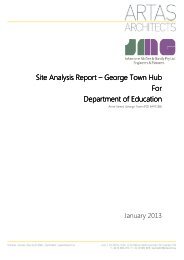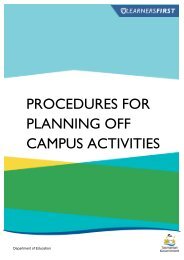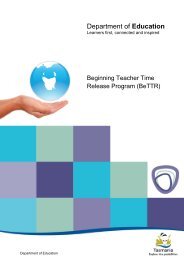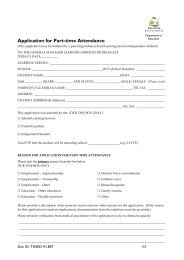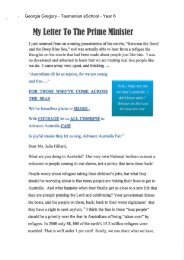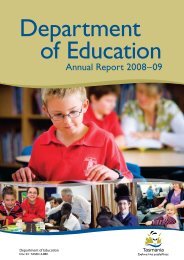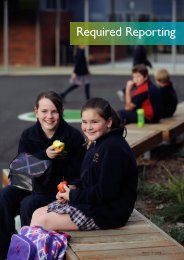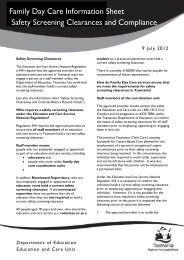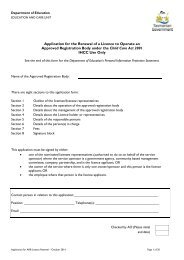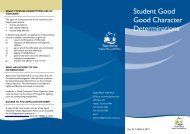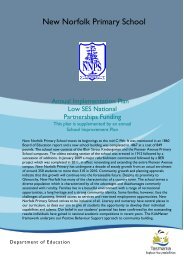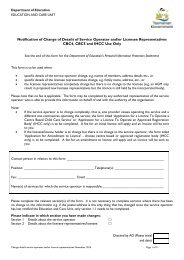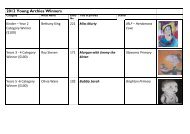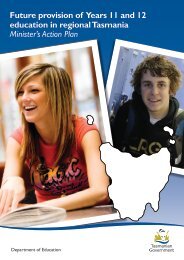Education
DoE Annual Report 2012-2013 - Department of Education
DoE Annual Report 2012-2013 - Department of Education
- No tags were found...
You also want an ePaper? Increase the reach of your titles
YUMPU automatically turns print PDFs into web optimized ePapers that Google loves.
Disability Framework for Action<br />
The state government’s original Disability Framework for<br />
Action 2005-2010 (DFA) required each agency to develop<br />
and implement a Disability Action Plan (DAP). The DFA sets<br />
out the government’s vision of Tasmania as an inclusive<br />
and caring community. It provides a whole-of-government<br />
approach to addressing the needs of people with disability<br />
in the design and delivery of all government policies,<br />
programs, services and facilities.<br />
A review of the DFA was undertaken by the Department<br />
of Premier and Cabinet (DPaC) in 2012 and the Premier<br />
launched the Disability Framework for Action 2013–2017.<br />
A review of the department’s DAP was delayed pending<br />
the DPaC review and was planned to commence in<br />
July 2013.<br />
The department’s Disability Action Plan 2008–2010 (DAP),<br />
which is available on the department’s website, includes<br />
measures to address issues identified in the framework as<br />
important to people with disability. This plan will remain<br />
in place until a full review is undertaken in line with the<br />
new DFA.<br />
The sections that follow describe some of the outcomes<br />
and achievements from the plan for 2012–13.<br />
Disability Standards for <strong>Education</strong> 2005<br />
The University of Canberra and education jurisdictions<br />
(including the department) commenced collaborative<br />
development of an eLearning resource to improve<br />
participants’ capacity to enact their obligations under the<br />
Disability Discrimination Act 1992 and the Disability Standards<br />
for <strong>Education</strong> (DSE) 2005 (“the Standards”).<br />
This eLearning is targeted to meet the different learning<br />
needs of key client groups (i.e. school teachers and<br />
administrative staff, educational leaders, and parents and<br />
caregivers) with a common core of content material.<br />
It is designed to develop the learner’s practical skills and<br />
strategies in regard to meeting the DSE through interactive,<br />
experiential learning, such as scenario-based problem<br />
solving. In each course participants will proceed through<br />
a series of compliance lessons and then work through<br />
the remaining material within the course to achieve<br />
desired learning outcomes. All learning material, including<br />
compliance lessons, will be presented in the following eight<br />
courses to reflect the learner’s specific context:<br />
1. Early childhood – prior to full-time school<br />
2. Early childhood – school<br />
3. Primary<br />
4. Junior secondary<br />
5. Senior secondary<br />
6. <strong>Education</strong>al leaders<br />
7. Parents and community<br />
8. <strong>Education</strong> assistants.<br />
More Support for Students with Disability National Partnership Agreement<br />
In the 2011 Federal Budget, funding was made available<br />
over two years to support programs for students with<br />
disability. The funding available to the state government<br />
system in Tasmania totalled $3.8 million, commencing in<br />
March 2012 and ceasing at the end of 2013.<br />
The funding was delivered through a national partnership<br />
agreement to ensure schools and teachers are better<br />
able to support students with disabilities, contributing<br />
to improved student learning experiences, educational<br />
outcomes and transitions to further education or work.<br />
The funding must be used to meet outputs devised at<br />
the commonwealth level within the advised timeline.<br />
Therefore consideration of sustainability is important and<br />
is addressed by focusing on building professional expertise,<br />
skills and knowledge through professional learning using<br />
train-the-trainer and cascade learning models.<br />
Components within the plan were developed in<br />
consultation with a range of key stakeholders including<br />
the Tasmanian Principals Association, the Special and<br />
Additional Needs Principal’s Reference Group,<br />
Managers–School Support, support staff and peak<br />
parent associations and disability groups.<br />
Project funding within Tasmanian Government schools is<br />
focused on achieving the following:<br />
1. Training for teachers to build their skills in<br />
special education<br />
A license has been purchased that allows all staff within<br />
the department to access a range of online professional<br />
learning modules across a range of disability areas.<br />
Twenty-three staff, including specialist support staff and<br />
class teachers, have been trained as facilitators to support<br />
the use of online disability modules within schools.<br />
The numbers of staff completing the modules are<br />
outlined below:<br />
Module<br />
Number<br />
of staff<br />
Motor Coordination Difficulties 48<br />
Managing Behaviour Difficulties 115<br />
Dyslexia 86<br />
Speech and Language Communication 57<br />
Autism Spectrum Disorder 122<br />
Vision and Hearing Loss 4<br />
Total 432<br />
Required Reporting » Disability Framework for Action<br />
71



